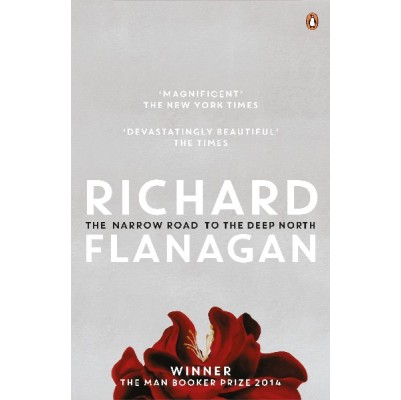Narrow Road To The Deep North, The
Flanagan, RichardAustralian surgeon Dorrigo Evans is a flawed man, struggling with the guilt of his love affair with his uncle's young wife. But he is also a hero; in a World War Two POW camp on the Thai-Burma railway, he is striving to keep the men in his charge alive. They face the worst of conditions, and for those who will survive, the trauma will be forever present.
Focusing on the lives of the Japanese and Korean guards as well as the Australian captives, this is an intense and challenging story that doesn't flinch from the brutality and violence of its setting. Winner of the Man Booker Prize for 2014. [Larger font]
Pages
467
467
Year
2013
2013
Reviews
06-11-2023
Was a very tough read but all but one were able to finish reading it. General agreement that it was very well-written and a "should read so that history is acknowledged and remembered" rather than an enjoyable book to recommend to your friends. Some unsure as to whether they would 'risk' another of his books!
05-09-2023
It would be wrong to say the group enjoyed this book, but all found it a riveting if confronting read. Several had to skip the more gruelling descriptions. All agreed Flanagan is a superb writer, that he developed complex characters and his descriptions were vivid (if sometimes a bit too vivid). Most were pleased they had read the book, even if at times the subject matter made it challenging.
08-06-2023
Very interesting read and very sad.
23-06-2022
Rather like the others, our group had mixed reactions to this confronting book. Three didn't finish it, as they found it depressing. A few admired his writing but didn't like the characters or the book particularly. And the rest thought it very good, most thought provoking, despite the graphic descriptions of what the POWs went through. We also found the Japanese and Korean perspectives interesting and it did slightly mitigate the horror with an understanding of how the different cultures perceive themselves. The majority, even if they didn't like it, thought that his writing was superb.
16-05-2018
Our group mostly enjoyed the book, giving it 8-9/10. Members who didn't enjoy it found it too dark and emotional and were unable to finish reading it. We had lots of discussion from the probing questions, all agreeing that Dorrigo was a complex character who shone in the POW camp as a strong and compassionate supporter of the Australian men. But failed miserably on a personal level with women. Many showed an interest in further reading with books listed in the notes.
16-05-2018
Some enjoyed this book while others found it too depressing. Many scenes dragged on far too long. Overall a good read though.
16-05-2018
The group thought it was a very challenging and harrowing read, but that the book was well-written.
16-05-2018
A brilliant book - Flanagan is an amazing writer and we can all highly recommend this book. We loved the link of lyrical haiku to the stark realities of the heinous atrocities of war; and the beauty versus brutality of life. We had an in depth discussion prompted by excellent questions, and it included our own family connections to war, WWI and WWII, through parents, grandparents etc. Most of us are keen to read more of Flanagan's work, and it's books like this that create a wonderful sense of book club value and appreciation.
16-05-2018
'The Narrow Road to the Deep North' is an epic novel which challenges the reader on many levels. Dorrigo Evans, a flawed and complex character, evokes both admiration and condemnation in the reader. Yes, he was a womaniser, but he displayed heroic leadership in the POW camp. We found the novel both well-written and engrossing, and agreed that the structure worked well. We would recommend it. The book notes and discussion questions were excellent.
16-05-2018
This is a very clever book although not an easy read. Dorrigo's constant self analysis put tension between his actions and his assessment of those actions - too much of this according to some members! To understand the author's portrayal of Dorrigo, it was necessary to pick up on his literary references - Ulysses in particular and the idea that all "heroes" are "flawed". The changes in time, place and subject in the writing was at first disconcerting, but served the purpose of "linking" aspects of themes that ran through the book.




